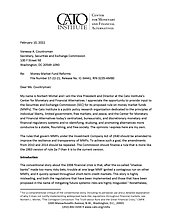Dear Ms. Countryman,
My name is Norbert Michel and I am the Vice President and Director at the Cato Institute’s Center for Monetary and Financial Alternatives. I appreciate the opportunity to provide input to the Securities and Exchange Commission (SEC) for its proposed rule on money market funds (MMFs). The Cato Institute is a public policy research organization dedicated to the principles of individual liberty, limited government, free markets, and peace, and the Center for Monetary and Financial Alternatives today’s centralized, bureaucratic, and discretionary monetary and financial‐regulatory systems and to identifying, studying, and promoting alternatives more conducive to a stable, flourishing, and free society. The opinions I express here are my own.
The rules that govern MMFs under the Investment Company Act of 1940 should be amended to improve the resilience and transparency of MMFs. To achieve such a goal, the amendments from 2010 and 2014 should be repealed. The Commission should finalize a rule that is more like the 1983 version of rule 2a‑7 than it is to the current version.
Introduction
The conventional story about the 2008 financial crisis is that, after the so‐called “shadow banks” made too many risky bets, trouble at one large MMF ignited a contagious run on other MMFs, and it quickly spread throughout short‐term credit markets. This story is highly misleading, and both the regulations that have been implemented and those that have been proposed in the name of mitigating future systemic risks are highly misguided. Nonetheless, federal officials relied heavily on the conventional story about the 2008 financial crisis to finalize new MMF rules in both 2010 and 2014. Overall, the 2010 and 2014 rule changes were not a success because they failed to create the stable MMF industry that supporters envisioned, and because they drastically reduced the funds available for financing commercial activity. For instance, the 2014 amendments caused a massive shift out of prime MMFs when shareholders moved more than $1 trillion into government MMFs ahead of the effective date (2016), dwarfing any of the outflows from prime MMFs during the 2008 crisis.
The Commission’s latest rule proposal partly acknowledges the failures of the previous MMF amendments, and the Commission deserves credit for recognizing those failures. Still, many of the same misguided views toward MMFs that drove many earlier rule amendments appears to be driving those in the new proposal. In 1981, for instance, Fed Chairman Paul Volcker testified before a Congressional committee that the Fed would prefer “money market funds be subject to regulations that would make them more competitive with banking institutions and less attractive to investors.” Volcker proposed that Congress give MMFs reserve requirements, as well as rules that prevented investors from redeeming their shares on demand.

This work is licensed under a Creative Commons Attribution-NonCommercial-ShareAlike 4.0 International License.

